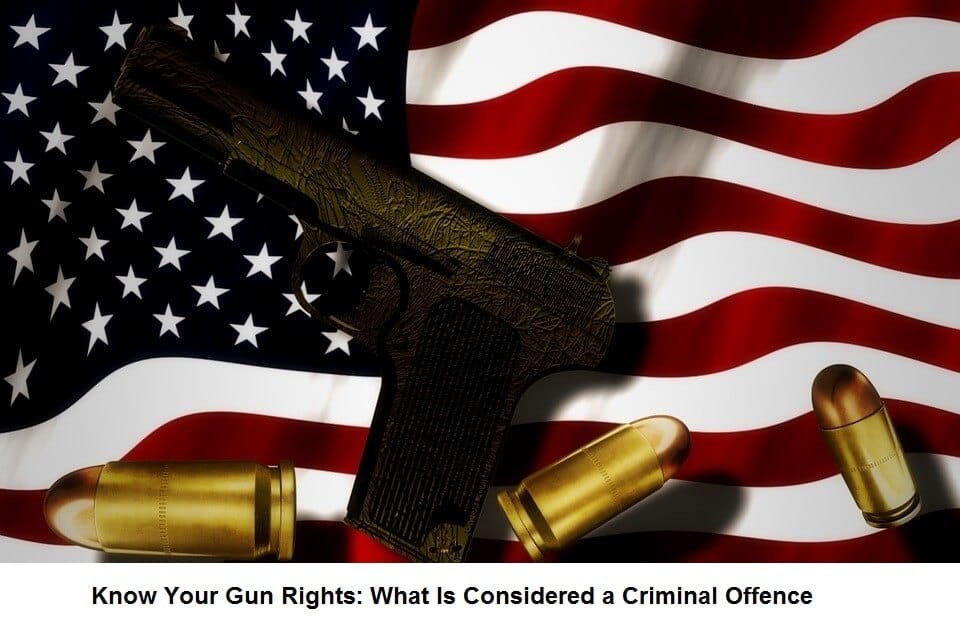Gun laws in the U.S. are a frequently discussed topic. Opinions are divided, but as things are at the moment, there are a lot of laws in place to stop people from misusing the weapons they own and prevent life-threatening situations.
Recreational use of guns, such as for hunting as an example, is commonly regarded as a legal activity. However, there are exceptions to the rules which everyone should know about.

Gun laws are in place to prevent any possible incidents, so as a gun owner, being informed should be on top of your list of priorities because a mistake involving a firearm can carry costly consequences.
Firing a Weapon Within City Limits
Using a weapon in an inhabited city area is classified as an abuse of gun rights. Discharging a firearm in such city environment is considered dangerous from obvious reason and the law states that one such act is a class 6 felony. If convicted, you are not only facing high fines and jail time but also your gun rights will be taken away.
There are, however, exceptions to this rule:
- The gun was fired further than one mile from an inhabited area
- The fired gun was filled with blanks
- You hold a special permit from the chief of police
- You are lawfully hunting during open season
- You are using the weapon as defence from a physical threat
- You have a permit for controlling wildlife by the relevant department in your state
Traveling With a Weapon
If you are driving cross country with a weapon, it is highly important to familiarize yourself with the gun laws of each state you will be going through. According to the McClure-Volkmer Act, you are allowed to drive with a firearm in your car as long as the weapon is cased, unloaded or locked up. This act also points out that the gun laws from the country that you reside in will apply to you if you are only passing through a different state, stopping only briefly for fuel, food or bathroom breaks. If you are staying in another state overnight then you must comply with their gun laws.
If you are under the age of 21, carrying a weapon in your vehicle is illegal and depending on the circumstances, it can be considered as a misdemeanor or a felony.
Weapon Misconduct
Weapon misconduct is a general term to describe the use of a firearm in a way that poses danger to the public. However, the punishment for such behavior are not fixed since circumstances can make a difference. Weapon misconduct can be considered a misdemeanor or a felony. The mildest offence a person can be charged with is a class 3 misdemeanor, while the highest is a class 2 felony.
Some examples of weapon misconduct are the following:
- Selling or handing a weapon to a minor without the consent of the parents
- Selling or handing a weapon to a person who has a previous conviction of weapon misconduct and has been stripped from their gun rights
- Defacing a deadly weapon
- Possessing a weapon on school grounds
- Possession of a prohibited weapon such as grenades, bombs, rockets, short barrel shotguns and nunchucks
- Using a weapon with the intention of committing a criminal act
- Handing a weapon to a person while being aware that they are going to use it to commit a criminal act
When Can You Lose Your Gun Rights?
If a person is found guilty of weapon misconduct, their gun rights will be cut short. The length of this ban will depend on the nature of the crime they have been convicted for.
A person who is convicted of felony due to their use of a weapon with the intention to cause physical harm to another person will not be eligible to have their gun rights reinstated after doing their time in prison and probation.
For serious offenses involving weapons yet without the intention to do harm, the person can have their gun rights reinstated 10 years after successfully completing the probation period.
Less serious felonies which are considered not dangerous come with 2 years waiting period after the probation is completed to have the gun rights reinstated.
Misdemeanors do not result in loss of gun rights unless a person is convicted of domestic violence. In such cases, the person will lose their gun rights for life.
However, gun laws reinstating is not a simple matter and other aspects such as criminal history, the gravity of the criminal offence and the probation performance play a crucial role.
The gun rights in the U.S. are made so each person can feel safer knowing that they can defend themselves in a life-threatening situation. However, there is a line which must not be crossed when it comes to using your gun. If you are charged with weapon misconduct, contacting a criminal justice attorney is highly advisable so you can stand the best chances in court to go without a felony conviction and keep your gun rights.


